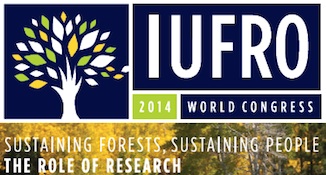What can researchers do to boost sustainability for forests and the people who depend on them? That is the question being posed by the 24th World Congress of the International Union of Forest Research Organizations (IUFRO), taking place in Salt Lake City, Utah, this week.
Head of Knowledge Management, Senior Research Fellow
Global Operations
SEI Headquarters

Thousands of delegates from over 100 countries are expected to attend the five-yearly IUFRO World Congress, to share knowledge and highlight new science and tools developed to enhance forest resources management and conservation. Three SEI experts will present some of the cutting edge work SEI has been carrying out under the Mistra-SWECIA research programme.
Science-based forest management decisions can do much to mitigate climate-related risks to timber production and forest biodiversity, but scientists often underestimate the challenges of communicating what they know to forest stakeholders in a way that leads to effective adaption action.
At the World Congress SEI Senior Research Fellow Åsa Gerger Swartling and Research Associate Gregor Vulturius will present a range of insights from a major study of the science-stakeholder interface in the Swedish forestry sector. A team of researchers have been interacting with thousands of forest owners and professionals up and down Sweden, through a survey and face-to-face meetings, to learn more about how they perceive, and respond to, climate change-related risks.
On Tuesday morning, Vulturius shared what has been learnt through the study about why forest stakeholders hold such varied perceptions about climate risks and the different adaptive strategies available. ‘It’s not just about maximizing profits and taking rational choices. Stakeholders are individuals with their own preferences and experiences. Gender, age, education, and their attitude to science in general are just some of the factors that influence how and whether they take adaptive action,’ says Vulturius.
On Friday Vulturius will also present what the study has learned about the effectiveness of climate change communication in promoting engagement with climate science and adaptation among forestry stakeholders, and Åsa GergerSwartling will present broader insights on the opportunities and challenges in science-stakeholder dialogue.
‘It’s essential that there is an active dialogue between scientists and stakeholders to ensure that both sides learn from each other. Scientists need to understand the different goals and drivers that influence forest stakeholders’ decisions. That’s the only way to ensure that the best decisions get made about adaptation,’ says Swartling.
Read a new Q&A with Swartling and Vulturius on their research.
On Monday afternoon, Research Fellow Olle Olson will argue that more attention should be paid to indirect impacts of climate change, as they relate to commercial forestry. While the potential direct climate change impacts on forests are now increasingly recognized – such as forest fires and storms, as well as increased productivity in some colder zones – few forestry decision makers and policy makers are thinking systematically about how climate change impacts in other parts of the world, and even in other sectors, could affect them. Read a Q&A with Olsson about indirect impacts.
The need for forestry to understand and respond to indirect impacts of climate change, presenter: Olle Olsson, in session A-30 (37), Achieving Policy Integration Across Fragmented Domains: Forest Policy Perspectives, 6 October, 15:30–18:00, Room 150 D
Tool development for analysing forest owners’ strategies to manage risks and adapt to climate change, poster presentation.
Explaining differences in perception of climate risks and adaptation measures among forest owners and forestry advisers, presenter: Gregor Vulturius, in session C-26 (27), Forest Owners and Climate Change Adaptation, 7 October, 8:00–10:30, Room 150 F
Climate change communication effectiveness in promoting engagement with climate science and adaptation among forestry stakeholders, presenter: Gregor Vulturius, in session C-23B (107B), Forest Management for Adaptation to Climate Change, 10 October, 8:00–10:30, Room 251 A-C
Exploring the science stakeholder interface in climate change adaptation research within Swedish forestry, presenter Åsa Gerger Swartling, in session A-37A (227A), Knowledge Exchange and Communication of Forest Research for Human and Community Well-Being, 10 October, 8:00–10:30, Room 150 A
Mistra-SWECIA is an eight-year Swedish interdisciplinary collaborative research programme on climate, impacts and adaptation. It is funded by the Swedish Foundation for Strategic Environmental Research, Mistra. Read more»
Read a Q&A with Åsa Gerger Swartling and Gregor Vulturius on communicating climate change to Swedish foresters»
Watch Gregor Vulturius’s Tedx talk ‘Communicating climate science’»
Read Olle Olsson’s Q&A on indirect climate impacts and forestry» and blog from the Swedish Forestry Assocation’s Annual Excursion 2014»
Read an OpEd article on climate adaptation in the Swedish forestry sector»
Design and development by Soapbox.
